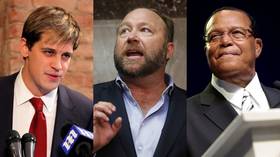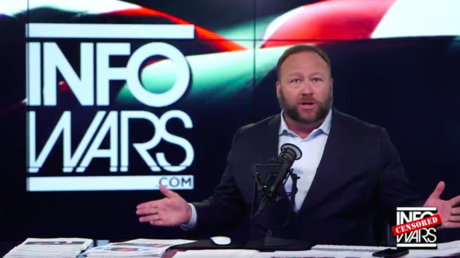Facebook ban on Alex Jones and others is a form of modern-day book burning

When social media platforms simultaneously banned Alex Jones last summer, I wrote that the decision was merely a “warning shot against dissent.” The latest Facebook bans against more conservative figures proves that point.
Facebook, citing company policies on “hate organizations,” has now banned Infowars, Alex Jones, Milo Yiannopoulos, and Louis Farrakhan, among others. If that was not bad enough, now even merely posting a link to Infowars content could get you in trouble, too.
When I criticized the earlier bans against Jones, I prefaced it by saying that I was not a fan, lest anyone assume my words were tantamount to an endorsement of his content or opinions. But there should be no need for such a semi-apologetic disclaimer. This is straight-up censorship and it should be condemned, regardless of anyone’s personal feelings toward the targets.
I’m fully creeped out by journalists cheering censorship.
— Bridget Phetasy (@BridgetPhetasy) May 2, 2019
The initial ban on Jones was an attempt to test the waters; to see how people might react to a popular figure being wiped from social media existence. When establishment journalists whooped and cheered in celebration, Facebook (and the rest) were emboldened. Consequently, we are now sliding down the slippery slope of internet censorship at frighteningly quick pace — and they are still cheering. Most news reports on the new ban have framed it positively as Facebook ‘taking action’ and finally doing the right thing.
Also on rt.com Liberal Twitter in free speech conundrum after Facebook bans Jones, Yiannopoulos and FarrakhanIt is undeniable that huge platforms like Facebook and Twitter are liberal organizations; liberal in the sense that they are committed to protecting the neo-liberal establishment and are far more sympathetic to the Democrats than Republicans. Conservatives are (rightly) up in arms about the latest expression of those allegiances — but if they really care about internet censorship and want to make the strongest possible argument against it, conservatives will also acknowledge that this is actually not just a left or right issue.
Facebook has taken extremely worrying steps against anti-establishment leftists, anti-war activists and socialists on the platform, too. In another so-called effort to get rid of “fake news,” it tweaked its algorithms in a way that sent traffic to socialist, government accountability and other progressive pages plummeting. Conservative agitators like Jones are not the only target. Dissent, in general, is the target — and there plenty more examples to prove it.
I agree. I grew up in a world where speech is censored. It’s not a good thing. It’s what you expect from dictatorships though, not from supposedly liberal-leaning entities.
— Yasmine Mohammed (@YasMohammedxx) May 3, 2019
In 2017, journalist Abby Martin’s former RT show, which covered issues like fracking, inequality, police brutality and US war crimes, was condemned by US intelligence agencies for fomenting “radical discontent” in a report that was lauded endlessly by mainstream news personalities. RT has since been a target of Facebook censorship.
Leftist Venezuelan news websites that stand against the Washington consensus and offer an alternate perspective on US involvement in Latin America have also been targeted. Facebook temporarily suspended Telesur and VenezuelaAnalysis without cause last year, for example. Twitter also suspended a number of official Venezuelan government and media accounts — a direct effort to meddle in the country’s political crisis on behalf of the US government and in support of an opposition leader who was never elected (but who was awarded with a blue-tick verification despite calling for a military coup).
“In a corporatist system of government, corporate censorship is state censorship,” independent journalist Caitlin Johnstone wrote on Twitter. Indeed, as we have seen, these tech companies are inexorably linked to the US government. They cave to censorship pressure from members of congress, they partner with US government-funded think tanks to weed out content that goes against mainstream narratives — and they do it all under the guise of protecting freedom and democracy. It is no stretch therefore to call Facebook censorship a kind of state censorship.
Also on rt.com Five examples that show internet censorship is as much a threat to the left as the rightI hate to be the bearer of bad news, but this is all only going to get worse. We already have sketchy CIA-linked organizations like NewsGuard giving ‘trust ratings’ to websites, which (surprise!) single out sites like the unimpeachable WikiLeaks as being unreliable.
Meanwhile, journalism nonprofits and pro-establishment newspapers are disseminating lists of unsanctioned websites from which we should apparently shield our impressionable eyes. We’ve seen multiple suggestions from people in power that something called “media literacy” be taught to children from a young age; media literacy in this case being a strange euphemism for ‘early indoctrination into a fully pro-establishment mindset.’
Don’t suppress speech you do not like—counter it. The truth will set us free—not censorship.
— Lila Rose (@LilaGraceRose) May 3, 2019
Many in favor of social media censorship argue that Facebook is a “private company” that can ban whoever it wants and that the US constitution’s first amendment on free speech does not apply. Such an argument can’t hold water when you consider how inextricably linked companies like Facebook and Twitter are to the government — and how they are effectively monopolies when it comes to information-sharing online.
Mother Jones blogger Kevin Drum wrote, private company argument aside, “...freedom of speech is an American tradition, not just a legal concept, and social media is where people speak these days. If you get banned from Facebook and half a dozen other big platforms, you’ve been effectively silenced.”
The right to freely pick and choose what news, information and opinions we want to expose ourselves to is paramount in a free and open society. Yet, once Facebook shows willingness to ban some people, it will be pressured to ban more and more. Where does it end?
Facebook’s reasoning and references to ‘hate speech’ and ‘promoting violence’ also fall flat when you consider that US government officials use social media to call for military actions that will result in mass violence and death on a regular basis — and they aren’t just promoting it, they’re actually doing it. When Alex Jones starts going outside and killing people in mass rampages, come back to me about banning him then.
What those celebrating these bans fail to understand is that censorship is never the solution. No matter how heinous the speech, stifling and suppressing it is never the answer. In fact, it will only serve to increase anger, social discontent and division. The only appropriate response to speech or thought which one finds incorrect and even abhorrent, is to either ignore it — or counter and debate it with better arguments.
Banning it is a form of modern-day book burning — and instead of condemning this as an assault on freedom of speech and information, mainstream journalists are nodding in unison about how terrible the book is.
The statements, views and opinions expressed in this column are solely those of the author and do not necessarily represent those of RT.

















